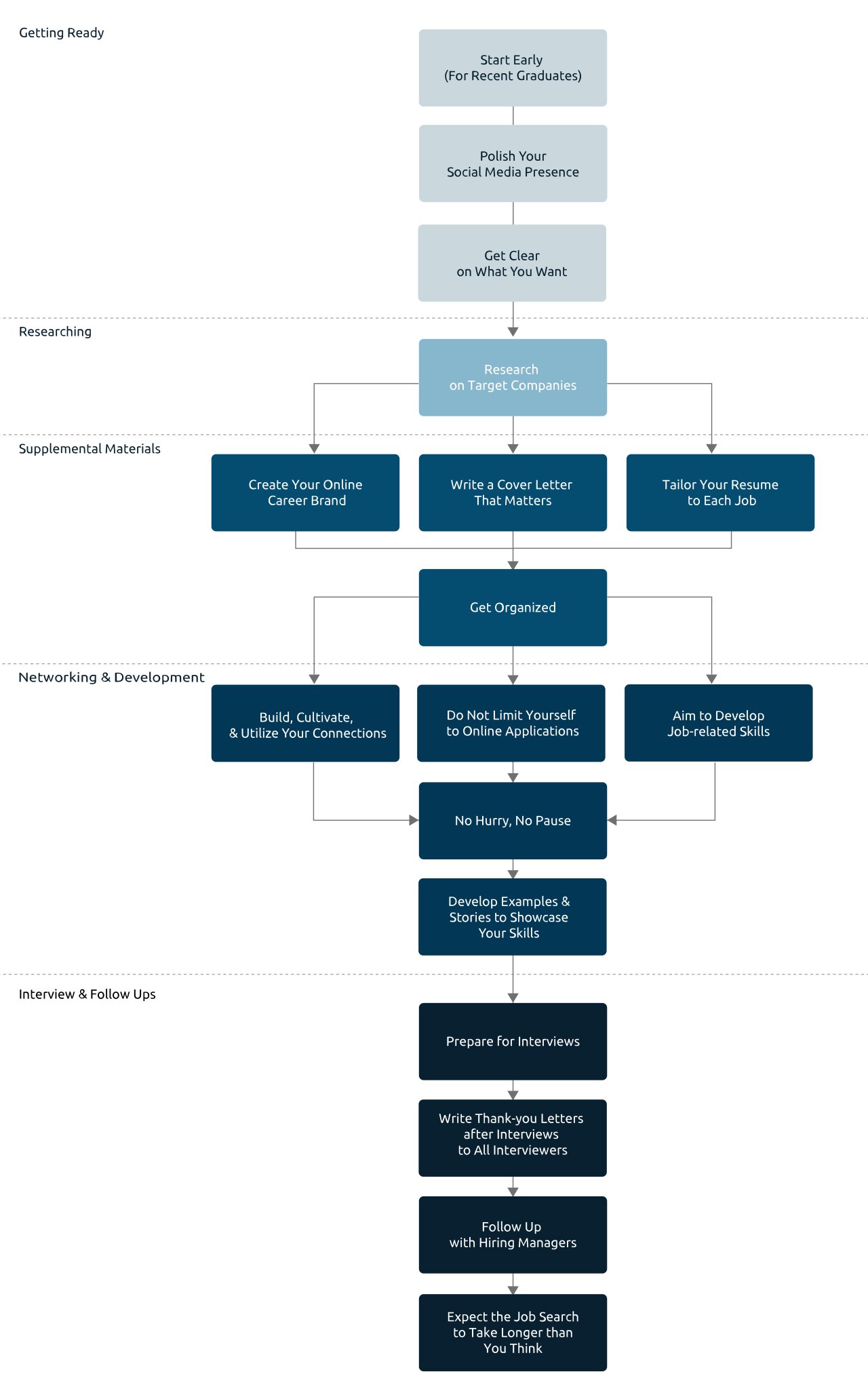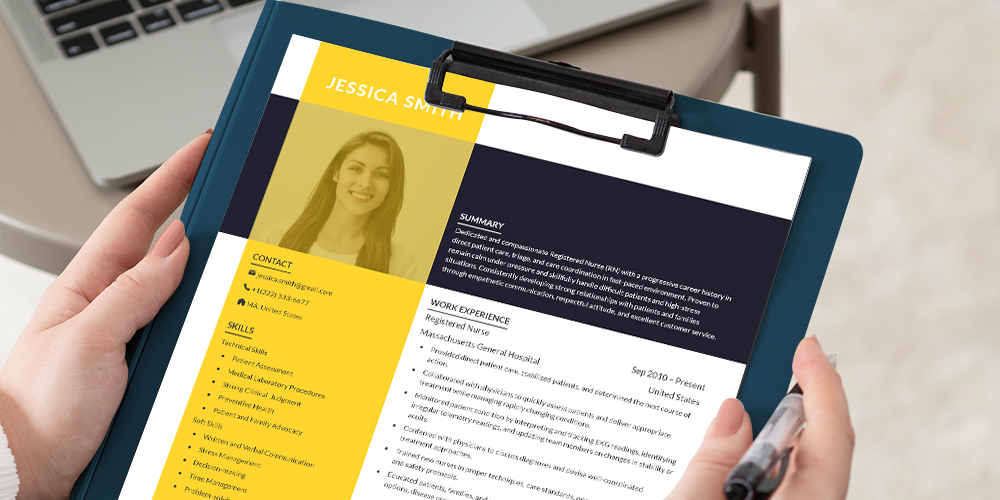
How to land your dream job? Well, unless you are one of the lucky applicants who work in a high-demand career, finding a new job can be a daunting and frustrating experience. Getting a job you are satisfied and fulfilled with is probably one of the most substantial moves you should get right in life. A good job can change your life, and as it so happens, finding a great job is one of the most difficult goals to achieve. In this process, you need resilience on top of having enough experience, the right skill set, character, and personality. Those who have been through this challenging process know how easily it will break a person down and how it will make them feel unqualified and purposeless.
Tons of smart and capable candidates have tried to crack the broken recruitment system. From LinkedIn to Monster to Glassdoor, quite a few platforms are trying to solve this problem, but unfortunately, none of them have done it yet. Since it does not look like the system will be fixed anytime soon, Radviser, your intelligent adviser, prepared you a guide to make the best of it. It might take a few months and more than what you think to get hired for a job.
This happens as you try to condense your entire being into a 1- to 2-page resume and a 3- to a 4-paragraph cover letter, then wait for people who are already busy with their real jobs to:
- Find your application
- Read your application
- Decode your application
- Decide if you are worthwhile to have a phone call with.
Job Hunting Flowchart
You can make the job search a bit easier on yourself if you follow a step-by-step procedure and apply proactive strategies to find a new job. The tips for finding a new job covered in this guide apply to all job seekers, from those just starting with no experience to experienced candidates who need a quick refresher. The flowchart below summarizes the different steps of the job-hunting process at any career level:

16 Steps to Land Your Dream Job
How to land your dream job and go from where you are to joining the people with their dream careers? here are 16 steps for landing your dream job:
0. Start Early (For Recent Graduates)
If you wait until you have graduated to begin thinking about finding a job, you are already behind. Job searching as a fresh graduate can take a lot longer than you imagine, leaving you jobless for weeks or months. Start as early as possible in your college/university to build your network by attending events on campus and securing summer internships. Try to gain some interviewing experience before you graduate.
Your college/university career centre is an excellent resource to conduct mock interviews. Being comfortable in an interview seat would serve you well in your post-graduate life. While you are there, talk to them about jobs for graduates with your interests and coursework.
1. Polish Your Social Media Presence
How to land your dream job easily? Take some time to clean up your social media profiles. Many employers will research you online, so you would rather remove anything unprofessional or potentially embarrassing, like:
- Party with inappropriate photos
- Overly political or otherwise divisive tweets or posts
- Out of date information on LinkedIn
- Any posts that you would not like your prospective employer to read
Not sure what social media posts are job search-friendly? A good rule of thumb is to remove any post that you would not like to see on the newspaper's front page.
2. Get Clear on What You Want
Before starting your job search, take the time to reflect on your strengths and weaknesses and the type of work you enjoy doing. The better you know yourself, the more likely you will find a new job that provides you with greater satisfaction. What do you want in a job? What is most important? Title, money, promotion, the work itself, location, or company culture?
Start thinking about (and writing down) your professional goals and dreams. Next, research potential opportunities and identify prospective employers in areas that might lead you to find your career goals. The more you explore your goals, the easier it will be to identify roles to help you achieve them. Similarly, the more you understand the duties involved in specific jobs, the easier it will be to tailor your resume to those opportunities.
If you are still unclear about which path to choose, you might want to consider conducting some informational interviews with people in fields that interest you. These individuals can offer insight and advice, and they might help you clarify which career is right for you.
3. Research on Target Companies
Once you know what you want, it is time to find out what the companies you are applying to want. You want to figure out what perfection looks like in the company's eyes that will be hiring you. This seems obvious, but a lot of people go about this all wrong. They decide what they are (i.e., a programmer, a writer, a lab tech) and then start building their resume without looking at what jobs they will be applying for. Then they try to fit the job description to their pre-made resume.
The most effective way to start building your resume is to first search for jobs. For instance, when someone is looking for content for Process Engineering roles, they might have a very vague idea of what responsibilities and requirements are for that position. That is because job requirements are always changing and, if you have been out of the job market for a while, chances are you have an outdated understanding of what is now required. So, the first thing is to look up your given subject and see what is out there and what is in demand. Here is how to decipher what you see:
- Job Description: Most companies use this job posting section to write generic things about "culture fit."
- Responsibilities: This is the most important section to look at. This is really what you will be doing on the job. You want to be able to do at least 70% of the things listed here. If there are some things you cannot do or have not done before, that is okay; that is called "room for growth." You should use this section to create an amazing set of resume and cover letter.
- Requirements: This section is just a filter and should be used as one. Employers like to exaggerate these qualifications because they think it will get them better candidates. Use these requirements very loosely. If it says, "minimum 8 years of experience…" and you only have 3 years of experience, then it is probably not a good fit, and they want someone more senior level. If it says, "minimum 4 years of experience…" and you have 3 years, then you should apply. Use this as a very rough filter of what they want.
salary_1_light_banner
4. Tailor Your Resume to Each Job
Your resume is still one of the most critical tools of how to land your dream job. Many resumes are full of responsibilities instead of tangible achievements, and job seekers send the same resume to various job postings. One of the best tips for finding a new job is to have an achievement-oriented resume that includes quantifiable achievements relevant to the job you are applying for.
Make yourself an obvious fit. Study the words and phrases that are used in the job responsibilities and requirements sections. Make sure you include them in your resume, provided you have that experience, of course. You can also get in touch with someone who works in the industry or in that specific role and ask the following questions:
- How would you prioritize the skills on this job description—which are the most important?
- What would you do if you were in my shoes trying to get this job?
Here are some tips for recent graduates on how to get your resume noticed:
- Remove the personal statement. They waste space, and you should also avoid describing yourself with generic words like "energetic" or "self-motivated." These descriptions will not help you stand out. Instead, write a professional summary outlining your most relevant skills and focusing on what you will offer the employer.
- Ensure your resume is keyword search-friendly. Prospective employers will look for terms related to specific competencies and technical skills listed in the job description. Many hiring managers also use Applicant Tracking Systems (ATS) to pick out the candidates who use keywords in their application materials. Key areas of expertise might include skills such as search engine optimization or financial accounting. And do not forget soft skills, which could include problem-solving or communication skills.
- Clarify what makes you unique. For example, most graduate resumes look the same, so include some relevant examples from your work experience or internships to get noticed. Employers want to see the results of your work, so do not just tell them what you have done — show them what you have delivered and how you have added value. Quantify your experience as much as possible by:
- Showing How Many, e.g., "Ensured compliance with the filing of 75 annual forms by 7 different company departments." instead of "Ensured compliance with filing of annual forms.”
- Showing How Much, e.g., "Implemented new payroll and tax accounting systems that saved the firm $1M in personnel costs over the next 10 years." instead of "Saved company money by finding ways to cut costs.”
- Showing How Often, e.g., "Managed switchboard with 10 incoming lines, effectively receiving and routing an average of 500 calls per day." instead of "Answered phones at the front desk.”
- Tailor your resume to each role. The recruiter should know within a few seconds of looking at your resume that you have the skills they are looking for. They want to know that you are applying to their specific job — not just to one of many jobs you saw online. Research the position and the employer you are applying to and highlight any skills and experience you have that they are looking for.
- Organize your resume to put the most relevant information for each employer up top. You can accomplish this by changing the order of your skills section to highlight the terms the employer used in the job posting. Also includes a "relevant employment" section, with an "additional experience" section below that, which will allow you to reorder your past jobs to showcase your most relevant experience.
- Emphasize your work experience. You will be in a much stronger position if you have some work experience or acquire some work experience while you are still studying. Not only does real-life work experience teach you skills, but it also helps you fill out your resume.
- Include all your past work experience, even if the work is not directly relevant to the jobs you are seeking or seems menial. The more experience you have, the more attractive you will look to hiring managers. The key is to focus on the transferable skills you gleaned from each role and how you can apply them to the job you want.
- Remember, internships count as work experience for recent graduates. So, if you have held internships in high school or college, highlight them in your resume.

5. Write a Cover Letter That Matters
You should treat the cover letter as your opportunity to begin a conversation with the person you are looking to work with. This is an opportunity and a difficulty for many applicants. If you get the cover letter right, you will be called in for an interview. If you get the cover letter wrong, you will be disqualified before even speaking to someone.
First, here is what not to do:
--Dear [Name],
I’m writing in response to your recently advertised position for a [Target Job Title]. I’m very interested in this opportunity with [Target Company Name] and believe that my qualifications, education, and professional experience would make me a great fit for this vacancy.
I’m a [Personal Characteristics] professional who can [How You Can Add Value to the Company].
Enclosed is my resume that shows my background in detail, and how they relate to your position. As you can see, [Related Key Achievements to the Position].
I’m confident that I can be a valuable asset to your team. I welcome the opportunity to speak with you about this position and how my experience could help [Target Company Name] achieve its goals.
Thank you in advance for your consideration.
Regards,
[Your Name]
Do not use this kind of template. It screams generic and adds absolutely no value to your job application.
This type of cover letter has more language than substance (language>substance). In other words, it uses lots of words and says almost nothing. Let’s look at a few sentences for instance:
- “I welcome the opportunity to speak with you about this position and how my experience could help your company achieve its goals.”
You welcome the opportunity? That is like saying, “I welcome you to give me a beer.” It sounds obnoxious or at best unpassionate. And what experience are you talking about? What goals will you help them achieve? Generic.
- I’m writing in response to your recently advertised position.
Duh. The only thing this demonstrates is that you don’t care about wasting their time.
- My experience could help your company achieve its goals?
What experience? Which goals? How can it help? This is the equivalent of saying, “I think this beer has water in it.” Okay, maybe not the best metaphor but you get the idea.
When writing a solid cover letter you want it to show three things:
- You know the company
- You have skills
- You have personality
cover_1_dark_banner
Here is the format that can get you a 40% reply rate:
Hi Steve,
I'm a huge fan of what you and your team do at Radviser. I know how difficult it is to find the right candidate, so I'll keep this short and sweet. Here are top 4 reasons I think you should consider me for the Marketing Manager vacancy:
- I've written for B2B companies like LinkedIn to generate leads through owned and earned content.
- I've managed a team of 10 writers and have a bachelors degree in creative writing.
- I've worked with startups from ground up to over 500k subscribers.
- I'm an avid student of Stefan Sagmeister and I'm always upgrading my skills in clarity and other best practices.
I'm excited for the opportunity to work with you and I'd love to hear more about the role and see if there's a good fit.
Respectfully,
James
All jobs have different levels of formality, and while the exact language might differ from job to job, the principle remains the same: say more with fewer words (substance>language). A human being is reading your cover letter, and they are not doing it for fun, so get to the point.
Let's break it down:
- Hi (Name): use Hi for less formality. Use a name if you can. If there is no name on the job posting, you can write, "Hi Radviser team,"
- I'm a huge fan of this does not need to be specific; it is just a great friendly opener.
- Bullet points: bullet points are much easier to read and later allow you to customize your cover letter with ease from job to job
Using this cover letter can get a higher reply rate and customize your cover letters for every job posting in minutes. Speed is the name of the game here.
To fill out the bullet points, use the "Responsibilities" section of the job posting. To fill in the first 3 bullet points, find the 3 most important qualities they want and address them with specific areas from your experience. Again be specific, so instead of saying, "I have 3 years of writing experience." Say something like, "I've written over 57 articles for B2B companies."
The final bullet point is very important. This is a place to stand out from the rest and show a hint of your personality. Add something personal and professional. Instead of the example above, for a design job, for instance, you could write something like, “I'm an avid enthusiast of Stefan Sagmeister and constantly study his portfolio to improve the relevance of my typography, design language, and clarity.”

6. Create Your Online Career Brand
Building your brand means showcasing your expertise and passion online, where employers searching the Web can find it. Many recruiters use LinkedIn as their primary search tool, and if you are a professional, you have to be using LinkedIn to your full advantage. It is a great source to find people working at companies that interest you and position yourself to be found by recruiters and hiring managers with relevant openings.
First impressions get you in the door, but to win a job, you need to have lasting substance; that is where LinkedIn comes in. Your LinkedIn is your cheat sheet. Here are the steps on how to create an all-star LinkedIn profile:
- Headline: If your headline is just your job title, you are missing a huge opportunity here. Use your headline as the elevator pitch of how you help companies become successful. For example: "Result-driven Project Engineer | 10+ years' experience leading major pipeline projects >$50M" This boosts you in recruiter search results and shows you know your market.
- Summary: A successful profile summary grabs the reader's attention and encourages them to continue reading or contact you. This section should help recruiters determine if you: (1) can do the job they are looking to fill; (2) will do the job; and (3) will fill in with the existing team/company's culture and values.
- Experience: Fill out all relevant positions you have had in the past. Keep this to the same bullet points format as the resume to be easily scannable (adding company logos is a good way to do this). You try to arm the Hiring Manager with weapons he can fire at you during your interview. The beauty of this is that you will know exactly how to counter-punch when they ask you about your experience by giving them the weapons here.
- Education, Projects, Publications, etc.: This is where you put in all the extra stuff you have done. Even if you do not think you have many of these, you should still fill this out as much as possible. A good way to fill this section out is by pulling projects and publications from your past work experience. Maybe you have not done these projects solo, but you have helped your company complete them, which should be reflected in your profile.
7. Get Organized
Before you start applying for jobs or interviewing with employers, take a moment to develop a system that works for you in organizing your job search. It is recommended you make a list/table of target companies, the job titles that you intend to apply/have applied for, their deadlines, the job descriptions, and the status of the positions (i.e., need to be submitted, under review, invited for interview) for each one to not miss any deadlines or documents.
8. Build, Cultivate, and Utilize Your Connections
For most job seekers, a large and strong network of contacts – people who know you and want to help you uncover job leads – results in more job opportunities. Networking – in person and online – is essential to your success in your job search. Do not be afraid of reaching out to people on LinkedIn, and if you know someone working at a company that interests you, ask for a referral. Hiring managers would prefer to interview people who came recommended before sorting through the resumes arriving via a career website.
Career fairs are another great opportunity to build your network, hear about job leads, and improve your interviewing skills.

9. Do Not Limit Yourself to Online Applications
If you rely only on submitting online applications, you could be looking for a job for a very long time. The company might be in the final interview stage by the time you apply, or the job might have even been filled. Contact companies that interest you directly - you might contact an internal recruiter or schedule informational interviews with people who work in those companies. Ideally, you want to know the people who might influence you to get your foot in the door.
10. Aim to Develop a Few Job-related Skills
It takes a great deal of time and effort to find a new job. In a long job search, it is easy to get discouraged and distracted, but by focusing on achieving daily goals and developing new skills, you can motivate yourself while also building a foundation for success.
11. No Hurry, No Pause
Looking for a job can be stressful. So, take some time to meditate, exercise, watch a movie, or do whatever helps you unwind. Create a good support network – having people to brainstorm with or vent your frustrations to smooth the entire job-seeking process.
At the beginning, you might be feeling a sense of desperation which is okay. What is not okay is to let desperation steer your path forward. The only thing that comes out of desperation is rushed work, rushed decisions, and few results.
Job-hunting is a depressing affair, no matter how you do it. You will have good weeks and bad weeks, good months and bad months. However, when you get good, and it finally clicks, you will see that you are valued, appreciated, and have a purpose. Until then, remember this: No Hurry, No Pause.
12. Develop Examples and Stories that Showcase Your Skills
This is one of the main steps of how to land your dream job. People remember stories, so your goal should be to develop a set of interview stories you can use in networking meetings or job interviews that demonstrate your skills, achievements, and passion for your work. Be memorable! Using stories may also help you feel more comfortable talking about yourself.
People remember stories, so one of our favorite tips for recent college grads is to develop several STAR (situation, task, action, result) examples to use in networking and interviewing situations that demonstrate your skills, accomplishments, passion for your work, teamwork, and problem-solving abilities.
Prepare examples that highlight what you have achieved, times you took the initiative, how you worked under pressure, or what it is like working as a team member, and use them as you develop cover letters and prepare for interviews.

13. Prepare for Interviews
Before you get called for your first interview, develop responses for common interview questions, and then practice them — ideally using the mock-interviewing technique with a friend, network contact, or interview coach. The more prepared you are for the interview, the more comfortable you will be, and you will likely succeed.
To excel in a job interview, keep these tips in mind:
- Research the employer and interviewers.
- Prepare answers to common general and competency-based interview questions and then practice them with a friend or interview coach. Be confident in your delivery, but not scripted or rehearsed. People can sense when you are not being authentic.
- Arrive a few minutes before your interview starts, use positive body language (firm handshake, friendly smile, good posture), and be friendly to everyone you meet.
- Ask questions at the end of the interview, thank them for their time, and ask about the next steps in the process.
14. Write Thank-you Letters after Interviews to All Interviewers
A short letter of thanks that emphasizes your interest and fit with the job and employer will not get you the job offer, but it will help make you stand out from the pool of candidates who do not bother with this simple act of courtesy. The majority of job seekers do not bother sending a thank-you letter at all.
15. Follow Up with Hiring Managers
Your work is not done once the interview is complete or the thank-you note sent. Following up with the hiring manager shows your interest and enthusiasm for the job. The key is doing so in a professional way while not making you sound pesky or needy.
16. Expect the Job Search to Take Longer than You Think
You can hope to have a new job within a short period, but the likely reality is that it might take months to find the right opportunity and get offered the position. You should mentally prepare yourself for a long battle — and then you can be happily surprised if you are one of the lucky few whose job search is short.
Final Tips on Landing Your Dream Job
Here are a few other tips for finding a new job if your job search situation does not fit the typical model – if finding employment will be unusually hard.
- First, having both a positive attitude and outlook is extremely important. Employers can sense desperation and despair; organizations want to hire positive and competent people. If you have been unemployed for a long period and depressed or recently downsized and angry, find a way to shrug it off when job-hunting, or you will only be hurting yourself.
- Second, if you are an older worker trying to find a job, you may face age discrimination. Among the ways to proactively counter any issues about your age are to limit the number of years of experience you list on your resume (by keeping to the last 10-15 years), eliminate dates in the education section of your resume, and focus on adaptability and flexibility in the interview.
- Third, remember that you may need additional training or experience, especially when entering a new career field.
- Fourth, you may need to consider temping or volunteering for a short period to gain experience and build network contacts that can lead to a full-time position.
- Fifth, in the most extreme cases, you may need to consider relocating to a place with a higher concentration of jobs in your field.
job_1_light_banner
Final Words
You need to learn how to land your dream job and if you read this guide so far, either (1) you do not have a job or (2) you have a job that you do not like. In both cases, bear in mind that progress is not linear. The future may seem out of reach at first, but it is not. The path to creating your career success and personal growth is more than possible and lies in the power of your hands. You need to be cautious and consistent. The above-mentioned tips will help you find a job that lights you up, makes an impact, and pays what you are worth. To learn more about the job-hunting process and its dos and don’ts, you’d better see our Library and update your knowledge of the field.













